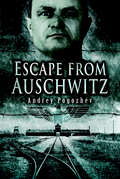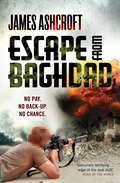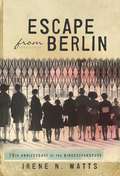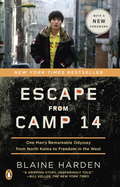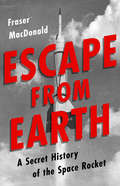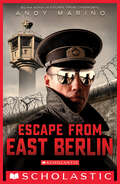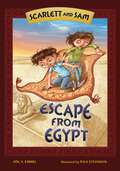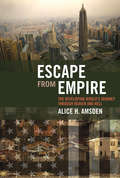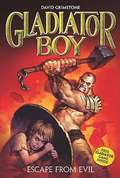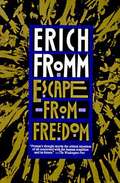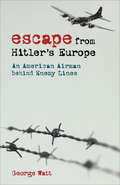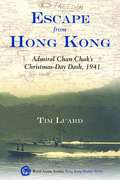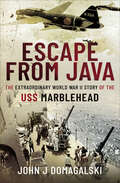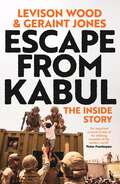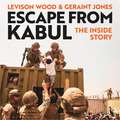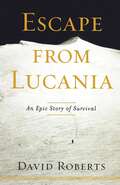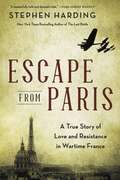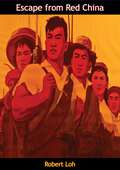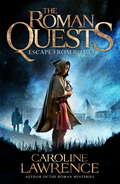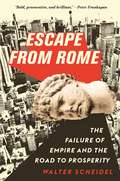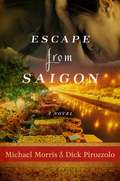- Table View
- List View
Escape from Auschwitz
by Andrey PogozhevThis memoir of a Soviet POW&’s escape from a Nazi concentration camp is a remarkable account of cruelty and courage during WWII. On November 6, 1942, seventy Soviet prisoners of war staged an extraordinary mass escape from Auschwitz. Among the escapees was prisoner number 1418, Andrey Pogozhev. One of the few who managed to evade the pursuing Nazi guards, Pogozhev lived to tell his story in this singular chronicle of wartime survival. Pogozhev was caught by the Germans in 1941 and immediately sent to Auschwitz. He and his Red Army comrades were then put to work on the Birkenau construction site. Sick, starving, and forced to work in sub-zero weather, more than three hundred Russian prisoners died in a single day. Pogohzev vividly recounts what life was like inside Auschwitz, how a group of prisoners managed to organize and execute one of the few successful escapes from Auschwitz, and his punishing journey as a fugitive fleeing through the Carpathian Mountains into the Ukraine.
Escape from Baghdad: First Time Was For the Money, This Time It's Personal
by James AshcroftGun-for-hire James 'Ash' Ashcroft thought he'd left Iraq behind. Last time he only got out alive thanks to the bravery of his interpreter and friend Sammy. But now a call for help means Ash must once again face the chaos of war-torn Baghdad - and this time there's no pay cheque. Abandoned by the occupying Coalition Forces, Sammy and his family face certain death at the hands of the Shia-dominated Iraqi Police and the death squads that roam the streets unless Ash and his team can get in and get them to safety over the border. This is the action-packed story of their audacious escape from Baghdad. It is a gripping account of the chaos of war, where the only thing that can be relied upon is the bond between former brothers-in-arms.
Escape from Berlin
by Irene N. WattsGood-bye Marianne - As autumn turns toward winter in 1938 Berlin, life for Marianne Kohn, a young Jewish girl, begins to crumble. First there was the burning of the neighborhood shops. Then her father, a bookseller, must leave the family and go into hiding. No longer allowed to go to school or even sit in a café, Marianne's only comfort is her beloved mother. Remember Me - Young Marianne is one of the lucky ones. She has escaped on the first Kindertransport organized to take Jewish children out of Germany to safety in Britain. At first Marianne is desperate. Marianne speaks little English and is made to feel unwelcomed in her sponsor's home and, most of all, she misses her mother terribly. As the months pass, she realizes that she cannot control the circumstances around her. She must rely on herself if she is to survive. Finding Sophie - Sophie Mandel was only seven years old when she arrived in London on the first Kindertransport from Germany. She has grown up with a friend of her parents, a woman she calls Aunt Em, and despite the war and its deprivations, she has made a good life for herself in England with her foster mother. She has even stopped thinking about the parents she left behind. Now the war is over, and fourteen-year-old Sophie is faced with a terrible dilemma. Where does she belong?
Escape from Camp 14: One Man's Remarkable Odyssey from North Korea to Freedom in the West
by Blaine Harden<p>A New York Times bestseller, the shocking story of one of the few people born in a North Korean political prison to have escaped and survived. <p>North Korea is isolated and hungry, bankrupt and belligerent. It is also armed with nuclear weapons. Between 150,000 and 200,000 people are being held in its political prison camps, which have existed twice as long as Stalin's Soviet gulags and twelve times as long as the Nazi concentration camps. Very few born and raised in these camps have escaped. But Shin Donghyuk did. <p>In <i>Escape from Camp 14</i>, acclaimed journalist Blaine Harden tells the story of Shin Dong-hyuk and through the lens of Shin's life unlocks the secrets of the world's most repressive totalitarian state. Shin knew nothing of civilized existence-he saw his mother as a competitor for food, guards raised him to be a snitch, and he witnessed the execution of his own family. <p>Through Harden's harrowing narrative of Shin's life and remarkable escape, he offers an unequaled inside account of one of the world's darkest nations and a riveting tale of endurance, courage, and survival.</p>
Escape from Earth: A Secret History of the Space Rocket
by Fraser MacDonaldThe long-buried truth about the dawn of the Space Age: lies, spies, socialism, and sex magick.Los Angeles, 1930s: Everyone knows that rockets are just toys, the stuff of cranks and pulp magazines. Nevertheless, an earnest engineering student named Frank Malina sets out to prove the doubters wrong. With the help of his friend Jack Parsons, a grandiose and occult-obsessed explosives enthusiast, Malina embarks on a journey that takes him from junk yards and desert lots to the heights of the military-industrial complex.Malina designs the first American rocket to reach space and establishes the Jet Propulsion Laboratory. But trouble soon finds him: the FBI suspects Malina of being a communist. And when some classified documents go missing, will his comrades prove as dependable as his engineering?Drawing on an astonishing array of untapped sources, including FBI documents and private archives, Escape From Earth tells the inspiring true story of Malina's achievements--and the political fear that's kept them hidden. At its heart, this is an Icarus tale: a real life fable about the miracle of human ingenuity and the frailty of dreams.
Escape from East Berlin
by Andy MarinoFrom the author of The Plot to Kill Hitler trilogy and Escape from Chernobyl comes another fast-paced, high-interest historical thriller, chronicling two daring attempts to cross the Berlin Wall, set decades apart.December, 1961 - Marta is a young girl who saw thirty miles of barbed wire appear across her city overnight, separating Berlin into West and East — with Marta’s home on the Communist Bloc-controlled eastern side.--January, 1989 - Now a spray-painted concrete monolith, the Berlin Wall bisects the city. Kurt, a young East Berliner, often wonders what those living on the other side must think of their unseen neighbors. Do they hate the people of East Germany as completely as Kurt has been instructed to hate them?--Inspired by real events, Escape from East Berlin tells two stories of daring bids for freedom from the Eastern Bloc, set decades apart and relayed in alternating perspectives. Triumph and tragedy intertwine in this examination of both the earliest and final days of the Berlin Wall.
Escape from Egypt: Escape From Egypt (Scarlett and Sam)
by Eric A. KimmelOne minute, twins Scarlett and Sam are bickering about who's going to read the Four Questions at the Passover seder. The next minute, they've been swept up by Grandma Mina's time-traveling carpet and dumped in the ancient Egyptian desert! And as if being stranded 3,000 years in the past isn't bad enough, they also find their fellow Hebrews suffering in slavery. So they team up with Moses, Aaron, and Miriam to help free the slaves. The future's looking bright! But the story they know so well doesn’t turn out the way they expected...
Escape from Empire: The Developing World's Journey through Heaven and Hell
by Alice H. AmsdenA provocative view of economic growth in the Third World argues that the countries that have achieved steady economic growth—including future economic superpowers India and China—have done so because they have resisted the American ideology of free markets. The American government has been both miracle worker and villain in the developing world. From the end of World War II until the 1980s poor countries, including many in Africa and the Middle East, enjoyed a modicum of economic growth. New industries mushroomed and skilled jobs multiplied, thanks in part to flexible American policies that showed an awareness of the diversity of Third World countries and an appreciation for their long-standing knowledge about how their own economies worked. Then during the Reagan era, American policy changed. The definition of laissez-faire shifted from "Do it your way," to an imperial "Do it our way." Growth in the developing world slowed, income inequalities skyrocketed, and financial crises raged. Only East Asian economies resisted the strict prescriptions of Washington and continued to boom. Why? In Escape from Empire, Alice Amsden argues provocatively that the more freedom a developing country has to determine its own policies, the faster its economy will grow. America's recent inflexibility—as it has single-mindedly imposed the same rules, laws, and institutions on all developing economies under its influence—has been the backdrop to the rise of two new giants, China and India, who have built economic power in their own way. Amsden describes the two eras in America's relationship with the developing world as "Heaven" and "Hell"—a beneficent and politically savvy empire followed by a dictatorial, ideology-driven one. What will the next American empire learn from the failure of the last? Amsden argues convincingly that the world—and the United States—will be infinitely better off if new centers of power are met with sensible policies rather than hard-knuckled ideologies. But, she asks, can it be done?
Escape from Evil #2
by James David Grimstone De La RueCaptured by slave-takers, Decimus Rex is forced to endure a series of trials in the dreaded Arena of Doom. With his five cellmates, Decimus faces a race over burning hot coals. He is then is forced into violent hand-to-hand combat with a fellow slave. Life can't get any more difficult than thisâ ¦ or can it? Will he ever be free? Or will he be subject to the cruel overlord Slavious Doom for ever?
Escape from Freedom
by Erich H. FrommA classic analysis of the problem of freedom, totalitarianism and participatory democracy.
Escape from Hitler's Europe: An American Airman behind Enemy Lines
by George Watt&“An absorbing story about how the Lincoln veteran George Watt managed to escape from Nazi-occupied Belgium.&”—San Francisco Review of Books November 1943: American flyer George Watt parachutes out of his burning warplane and lands in rural Nazi-occupied Belgium. Escape from Hitler&’s Europe is the incredible story of his getaway—how brave villagers spirited him to Brussels to connect with the Comet Line, a rescue arm of the Belgian resistance. This was a gravely dangerous mission, especially for a Jewish soldier who had fought against Franco in the Spanish Civil War. Watt recounts dodging the Gestapo, entering Paris via the underground, and finally, crossing the treacherous Pyrenees into Spain. In 1985, he returned to Belgium and discovered an astonishing postscript to his wartime experiences. &“A story of what is best in human beings triumphing over what is worst.&”—John Sayles, author of Yellow Earth &“One of those rare little narratives that engage the reader from the first page to the last . . . It is about the human spirit and those willing to risk their lives for a stranger.&”—Library Journal "A hell of an adventure story."―Ring Lardner, Jr., author of The Ecstasy of Owen Muir &“This is one of my favorite books about World War II, and the first I have read that is about the Comet Line and the people who helped with running it.&”—Armchair Interviews &“This is an interesting and exciting account that provides a first-person examination of the plight of an individual airman, and insights into the scope, risks, and techniques of the Belgian and French underground movements.&”—Col. Stetson M. Siler, USAF (Ret.)
Escape from Hong Kong
by Tim LuardOn 25 December 1941, the day of Hong Kong's surrender to the Japanese, Admiral Chan Chak - the Chinese Government's chief agent in Hong Kong - and more than 60 Chinese, British and Danish intelligence, naval and marine personnel made a dramatic escape from the invading army. They travelled on five small motor torpedo boats - all that remained of the Royal Navy in Hong Kong - across Mirs Bay, landing at a beach near Nan'ao. Then, guided by guerrillas and villagers, they walked for four days through enemy lines to Huizhou, before flying to Chongqing or travelling by land to Burma. The breakout laid the foundations of an escape trail jointly used by the British Army Aid Group and the East River Column for the rest of the war. Chan Chak, the celebrated 'one-legged admiral', became Mayor of Canton after the war and was knighted by the British for his services to the Allied cause. His comrade in the escape, David MacDougall became head of the civil administration of Hong Kong in 1945. This gripping narrative account of the escape draws on a wealth of primary sources in both English and Chinese and sheds new light on the role played by the Chinese in the defence of Hong Kong, on the diplomacy behind the escape, and on the guerillas who carried the Admiral in a sedan chair as they led his party over the rivers and mountains of enemy-occupied China. Escape from Hong Kong will appeal not just to military and other historians and those with a special interest in Hong Kong and China but also to anyone who appreciates a good old-fashioned adventure story. Tim Luard is a former Beijing correspondent for the BBC World Service.
Escape from Java: The Extraordinary World War II Story of the USS Marblehead
by John J. DomagalskiThe harrowing, triumphant true story of an antiquated light cruiser and its crew suddenly under fire in the Pacific as WWII erupted: &“An engrossing tale.&” —Naval Historical Foundation The old light cruiser Marblehead was living out her final years of naval service as a member of the United States Asiatic Fleet in 1941. The small group of mostly antiquated ships based in the Philippines sailed the waters of East Asia to show the American flag in places like China, Hong Kong, Japan, and Singapore. Then the sudden eruption of World War II in the Pacific put the warship on the front lines of the conflict as Imperial Japan unleased a series of devastating attacks across the region. On the morning of February 4, 1942, the warship was surprised by Japanese planes northeast of Java. Two large bombs slammed into Marblehead, causing fires and casualties and knocking out her steering gear. A third bomb exploded close by underwater. The near miss ripped a large gash into her hull, allowing a torrent of water to rush inside the ship. Escape from Java takes us throughout the ship as the story unfolds—next to gunners toiling to keep their guns firing, with medical staff tending to the wounded, and alongside damage control sailors working in flooded compartments. The Japanese confidently radioed that they had sunk the ship—but through courage, sacrifice, and superhuman effort, Marblehead would set out on a harrowing 13,000-mile journey back to the US . . . &“An engrossing tale of an obsolescent ship&’s survival amid great odds set against the brutal early fighting of the Pacific War. This book will appeal to a wide audience not only as high wartime adventure but simply as a story of gritty perseverance when the odds are heavily against.&” —Naval Historical Foundation
Escape from Kabul: The Inside Story
by Levison Wood Geraint Jones'An important account of one of the defining moments of the modern world' PETER FRANKOPANThe evacuation of Kabul in August 2021 will go down in military history as one of the most unexpected events in modern times. In an eerie replay of the disastrous British retreat from Kabul in 1842, coalition troops withdrew from Afghanistan after twenty years of military campaigning. The subsequent collapse of the Afghan government and its army shocked the world, as a resurgent Taliban gathered its forces and swept across the country. Thousands of Afghans who had worked with the allies were left to the meagre mercy of the Taliban.As the Taliban went door to door to execute 'collaborators', a small international task force set out on a daring mission to evacuate as many Afghans and their families as possible.Drawing on a wide range of first-hand accounts - the politicians and officers who planned the trans-continental rescue, the young soldiers who were faced with the unenviable task of keeping a crowd of thousands of desperate people at bay, former interpreters and soldiers of the Afghan Special Forces who made it out - Escape from Kabul is the harrowing true story of Operation Pitting and the Kabul airlift.
Escape from Kabul: The Inside Story
by Levison Wood Geraint Jones'An important account of one of the defining moments of the modern world' PETER FRANKOPANThe evacuation of Kabul in August 2021 will go down in military history as one of the most unexpected events in modern times. In an eerie replay of the disastrous British retreat from Kabul in 1842, coalition troops withdrew from Afghanistan after twenty years of military campaigning. The subsequent collapse of the Afghan government and its army shocked the world, as a resurgent Taliban gathered its forces and swept across the country. Thousands of Afghans who had worked with the allies were left to the meagre mercy of the Taliban.As the Taliban went door to door to execute 'collaborators', a small international task force set out on a daring mission to evacuate as many Afghans and their families as possible.Drawing on a wide range of first-hand accounts - the politicians and officers who planned the trans-continental rescue, the young soldiers who were faced with the unenviable task of keeping a crowd of thousands of desperate people at bay, former interpreters and soldiers of the Afghan Special Forces who made it out - Escape from Kabul is the harrowing true story of Operation Pitting and the Kabul airlift.
Escape from Kabul: The Inside Story
by Levison Wood Geraint JonesAfghanistan, August 2021. As the clock ticks down to a total Allied withdrawal and the Taliban go door to door to execute 'collaborators', a small, semi-official force of allied Paratroopers and Marines set about evacuating as many Afghans and their families as possible.The evacuation of Kabul in August 2021 will go down in military history as one of the most unexpected events in modern times. In an eerie replay of the disastrous British retreat from Kabul in 1842, coalition troops withdrew from Afghanistan after 20 years of military campaigning. The subsequent collapse of the Afghan governmentand its army shocked the world, as a resurgent Taliban gathered its forces and swept across the country. Thousands of Afghans who had worked with the allies were left to the meagre mercy of the Taliban.As the Taliban went door to door to execute 'collaborators', a small international task force set out on a daring mission to evacuate as many Afghans and their families as possible.Drawing on a wide range of first-hand accounts - the politicians and officers who planned the trans-continental rescue, the young soldiers who were faced with the unenviable task of keeping a crowd of thousands of desperate people at bay, former interpreters and soldiers of the Afghan Special Forces who made it out - Escape from Kabul is the harrowing true story of Operation Pitting and the Kabul airlift.(P) 2023 Hodder & Stoughton Limited
Escape from Lucania: An Epic Story of Survival
by David RobertsIn 1937, Mount Lucania was the highest unclimbed peak in North America. Located deep within the Saint Elias mountain range, which straddles the border of Alaska and the Yukon, and surrounded by glacial peaks, Lucania was all but inaccessible. The leader of one failed expedition deemed it "impregnable." But in that year, a pair of daring young climbers would attempt a first ascent, not knowing that their quest would turn into a perilous struggle for survival. Escape from Lucania is their remarkable story.Classmates and fellow members of the Harvard Mountaineering Club, Brad Washburn and Bob Bates were two talented young men -- handsome, intelligent, and filled with a zest for exploring. Both were ambitious climbers, part of a small group whose first ascents in the great mountain ranges during the 1930s and 1940s changed the face of American mountaineering. Setting their sights on summitting Lucania in the summer of 1937, Washburn and Bates put together a team of four climbers for the expedition. But when Bates and Washburn flew to the Walsh Glacier at the foot of Lucania, they discovered that freakish weather conditions had turned the ice to slush. Their pilot was barely able to take off again alone, and there was no question of returning with the other two climbers or more supplies. Washburn and Bates found themselves marooned on the glacier, more than a hundred miles from help, in forbidding and desolate territory. Eschewing a trek out to the nearest mining town -- eighty miles away by air -- they decided to press ahead with their expedition. Escape from Lucania recounts Washburn and Bates's determined drive toward Lucania's 17,150-foot summit under constant threat of avalanches, blinding snowstorms, and hidden crevasses. Against awesome odds they became the first to set foot on Lucania's peak, not realizing that their greatest challenge still lay beyond. Nearly a month after being stranded on the glacier and with their supplies running dangerously low, they would have to navigate their way out through uncharted Yukon territory, racing against time as the summer warmth caused rivers to swell and flood to unfordable depths. But even as their situation grew more and more desperate, they refused to give up. Escape from Lucania tells this amazing story in thrilling and vivid detail, from the climbers' exultation at reaching the summit to their darkest moments confronting seemingly insurmountable obstacles. It is a tale of awesome adventure and harrowing danger. But above all it is the story of two men of extraordinary spirit, inspiring comradeship, and great courage. Today Washburn and Bates, now in their nineties, are legends in climbing circles. Bates co-led 1938 and 1953 expeditions to K2, the world's second-highest mountain. Washburn, whose record of Alaskan first ascents is unmatched, became founding director of Boston's Museum of Science and is one of the premier mountain photographers in the world. Some of his remarkable images from the 1937 Lucania expedition are included in this book.
Escape from New York: The New Negro Renaissance beyond Harlem
by Davarian L. BaldwinIn the midst of vast cultural and political shifts in the early twentieth century, politicians and cultural observers variously hailed and decried the rise of the &“New Negro.&” This phenomenon was most clearly manifest in the United States through the outpouring of Black arts and letters and social commentary known as the Harlem Renaissance. What is less known is how far afield of Harlem that renaissance flourished—how much the New Negro movement was actually just one part of a collective explosion of political protest, cultural expression, and intellectual debate all over the world. In this volume, the Harlem Renaissance &“escapes from New York&” into its proper global context. These essays recover the broader New Negro experience as social movements, popular cultures, and public behavior spanned the globe from New York to New Orleans, from Paris to the Philippines and beyond. Escape from New York does not so much map the many sites of this early twentieth-century Black internationalism as it draws attention to how New Negroes and their global allies already lived. Resituating the Harlem Renaissance, the book stresses the need for scholarship to catch up with the historical reality of the New Negro experience. This more comprehensive vision serves as a lens through which to better understand capitalist developments, imperial expansions, and the formation of brave new worlds in the early twentieth century.Contributors: Anastasia Curwood, Vanderbilt U; Frank A. Guridy, U of Texas at Austin; Claudrena Harold, U of Virginia; Jeannette Eileen Jones, U of Nebraska–Lincoln; Andrew W. Kahrl, Marquette U; Shannon King, College of Wooster; Charlie Lester; Thabiti Lewis, Washington State U, Vancouver; Treva Lindsey, U of Missouri–Columbia; David Luis-Brown, Claremont Graduate U; Emily Lutenski, Saint Louis U; Mark Anthony Neal, Duke U; Yuichiro Onishi, U of Minnesota, Twin Cities; Theresa Runstedtler, U at Buffalo (SUNY); T. Denean Sharpley-Whiting, Vanderbilt U; Michelle Stephens, Rutgers U, New Brunswick; Jennifer M. Wilks, U of Texas at Austin; Chad Williams, Brandeis U.
Escape from Paris (Carolyn Hart Classics #3)
by Carolyn HartRomantic suspense amid the chaos of a world at war. The year is 1940. As England braces for invasion and the German army overruns Europe, two American sisters in Paris risk their lives to save a downed British airman from Nazi arrest. Linda Rossiter and Eleanor Masson soon realize the price they may pay when they read this ominous public notice: "All persons harbouring English soldiers must deliver same to the nearest Kommandantur not later than 20 October 1940. Those persons who continue to harbour Englishmen after this date without having notified the authorities will be shot." On Christmas Eve, the Gestapo sets a trap, and death is only a step behind the two American women.
Escape from Paris: A True Story of Love and Resistance in Wartime France
by Stephen HardingThis book is The Nightingale meets All the Light We Cannot See, only it's all true--a thrilling wartime adventure story of downed American aviators rescued by French resistance fighters, taken to Nazi-occupied Paris, and hidden under the very noses of the GestapoEscape from Paris is the true story of a small group of U.S. aviators whose four B-17 Flying Fortresses were shot down over German-occupied France on a single, fateful day: July 14, 1943, Bastille Day. They were rescued by brave French civilians and taken to Paris for eventual escape out of France. In the French capital, where German troops walked on every street and Gestapo agents hid around every corner, the flyers met a brave Parisian resistance family living and working in the Hôtel des Invalides, a complex of buildings and military memorials, where Nazi officials had set up offices. Hidden in the complex the Americans, along with dozens of other downed Allied pilots and resistance operatives, hatched daring escape plots. The danger of discovery by the Nazis grew every day, as did an unlikely romance when one of the American airmen begins a star-crossed wartime romance with the twenty-two-year old daughter of the family sheltering him--a noir tale of war, courage and desperation in the shadows of the City of Light.Based on official American, French, and German documents, histories, personal memoirs, and the author's interviews with several of the story's key participants, Escape from Paris crosses the traditional lines of World War II history with tense drama of air combat over Europe, the intrigue of occupied Paris, and courageous American and Allied pilots and French resistance fighters pitted against Nazi thugs. All of this set in one of the world's most beautiful and captivating cities.
Escape from Red China
by Humphrey Evans Robert LohThe experiences and attitudes of a man who lived under Chinese Communism, rising to a position of importance before his decision to flee to the West, whose story describes much of life and society under Maoism.Robert Loh is the first educated Chinese to give a view from the inside of life in Red China. Son of a well-to-do family who was sent to study political science in the United States during the period when the authority of the Nationalist Government was disintegrating, Loh chose to return to Shanghai to contribute what he could toward reshaping China into a major world power. Robert Loh is at pains to make clear that he could not have survived, and indeed lived a relatively privileged life in communist China without giving in to much that he hated and despised.
Escape from Rome: Book 1 (Roman Quests #1)
by Caroline LawrenceThe first in a brand new historical adventure series from million-copy-selling Caroline Lawrence, set in Roman Britain during the reign of the evil Emperor Domitian. <P><P>The year is AD 94. When the evil Emperor Domitian sends soldiers to seize his family's home in the middle of the night, twelve-year-old Juba must escape with his brother and sisters, and journey to distant Britannia on the edge of the known world. <P><P>His task: To avoid capture and death. His quest: To find a safe haven in Britain. <P><P>His destiny: To save the children. Brand new exciting Roman series from the bestselling author of THE ROMAN MYSTERIES, perfect for children studying at Key Stage 2. Historical locations featured in book 1 are Rome, Ostia, Londinium and Fishbourne.
Escape from Rome: Book 1 (The Roman Quests #1)
by Caroline LawrenceThe first in a brand new historical adventure series from million-copy-selling Caroline Lawrence, set in Roman Britain during the reign of the evil Emperor Domitian.The year is AD 94. When the evil Emperor Domitian sends soldiers to seize his family's home in the middle of the night, twelve-year-old Juba must escape with his brother and sisters, and journey to distant Britannia on the edge of the known world.His task: To avoid capture and death. His quest: To find a safe haven in Britain.His destiny: To save the children. Brand new exciting Roman series from the bestselling author of THE ROMAN MYSTERIES, perfect for children studying at Key Stage 2. Historical locations featured in book 1 are Rome, Ostia, Londinium and Fishbourne.
Escape from Rome: The Failure of Empire and the Road to Prosperity (The\princeton Economic History Of The Western World Ser. #94)
by Walter ScheidelThe gripping story of how the end of the Roman Empire was the beginning of the modern worldThe fall of the Roman Empire has long been considered one of the greatest disasters in history. But in this groundbreaking book, Walter Scheidel argues that Rome's dramatic collapse was actually the best thing that ever happened, clearing the path for Europe's economic rise and the creation of the modern age. Ranging across the entire premodern world, Escape from Rome offers new answers to some of the biggest questions in history: Why did the Roman Empire appear? Why did nothing like it ever return to Europe? And, above all, why did Europeans come to dominate the world?In an absorbing narrative that begins with ancient Rome but stretches far beyond it, from Byzantium to China and from Genghis Khan to Napoleon, Scheidel shows how the demise of Rome and the enduring failure of empire-building on European soil ensured competitive fragmentation between and within states. This rich diversity encouraged political, economic, scientific, and technological breakthroughs that allowed Europe to surge ahead while other parts of the world lagged behind, burdened as they were by traditional empires and predatory regimes that lived by conquest. It wasn’t until Europe "escaped" from Rome that it launched an economic transformation that changed the continent and ultimately the world.What has the Roman Empire ever done for us? Fall and go away.
Escape from Saigon: A Novel
by Michael Morris Dick PirozzoloFew thirty-day periods in history have been more tumultuous than the fall of Saigon in April of 1975. Few thirty-day periods in history have been more tumultuous than the fall of Saigon in April of 1975. With US military now gone for two years, the North Vietnamese Army routed South Vietnam's forces, resulting in thousands of refugees pouring into the former colonial capital. The world watched and waited for what many expected would be a bloodbath.Escape from Saigon follows various people trapped in the besieged city. Among them are a former GI attempting to rescue his Vietnamese wife's terrified relatives; a Vietnamese-American television reporter whose conflicted heritage threatens her future; an American businessman risking his life to smuggle out his employees; and the last remaining US diplomatic personnel in Saigon, including the ambassador, military liaisons, and CIA operatives. The NVA onslaught is spearheaded by two officers-one intent on maintaining military restraint, the other bent on revenge and will sweep up families, friends, and comrades in this final chapter of a war that has already taken millions of lives.Escape from Saigon is a story of a city and its inhabitants struggling to survive in its most desperate hours-a tale that stays true to the historic record while recounting moments of human hardship, courage, and triumph.Skyhorse Publishing, as well as our Arcade, Yucca, and Good Books imprints, are proud to publish a broad range of books for readers interested in fiction-novels, novellas, political and medical thrillers, comedy, satire, historical fiction, romance, erotic and love stories, mystery, classic literature, folklore and mythology, literary classics including Shakespeare, Dumas, Wilde, Cather, and much more. While not every title we publish becomes a New York Times bestseller or a national bestseller, we are committed to books on subjects that are sometimes overlooked and to authors whose work might not otherwise find a home.
